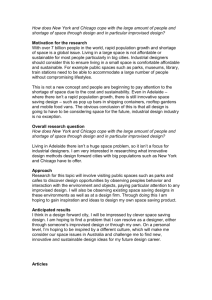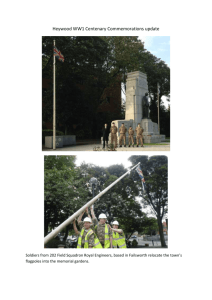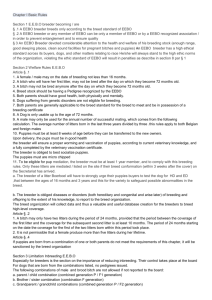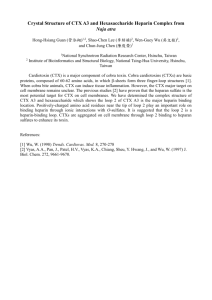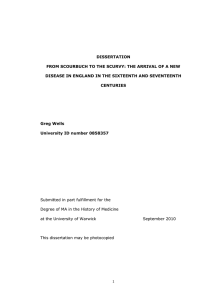Appendix 1: The Red Bull stage
advertisement
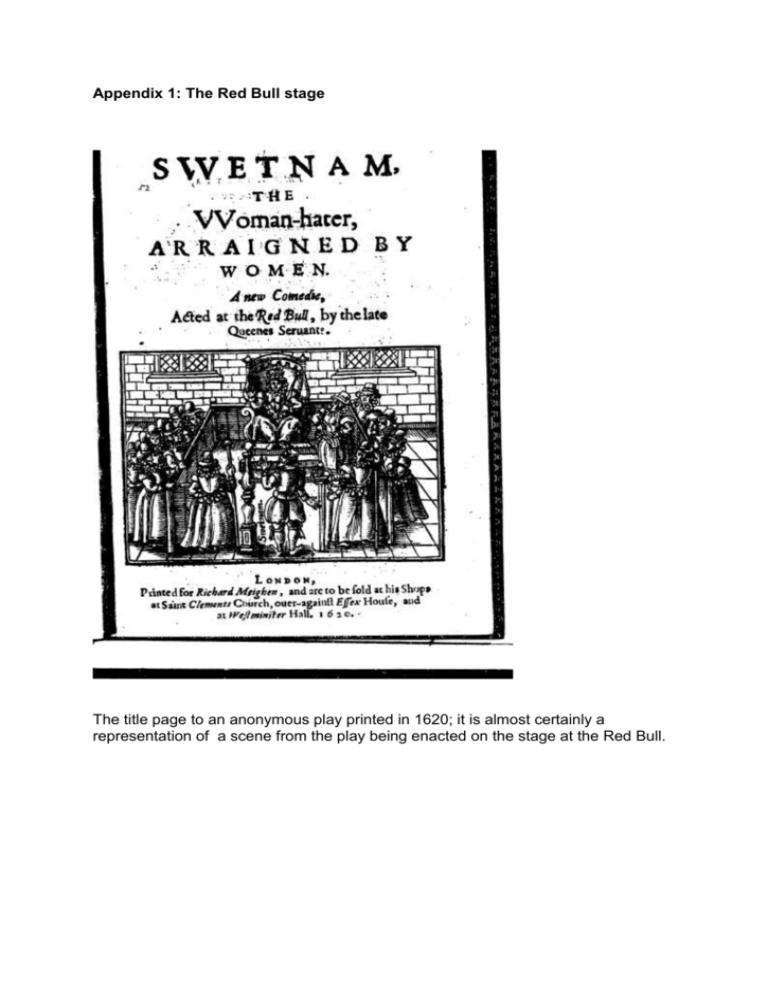
Appendix 1: The Red Bull stage The title page to an anonymous play printed in 1620; it is almost certainly a representation of a scene from the play being enacted on the stage at the Red Bull. Appendix 2 The printers' title-pages for the five successive editions of The Rape of Lucrece 1608 The rape of Lucrece a true Roman tragedy. With the several songs in their apt places, by Valerius, the merry lord amongst the Roman peers. Acted by her Majesty's Servants at the Red-Bull, near Clerkenwell. Written by Thomas Heywood, London: Printed by E. Allde for J.Busby and are to be sold by Nathaniel Butter in Paul's Churchyard at the sign of the Pied-Bull, 1608. 1609 The rape of Lucrece. A true Roman tragedy. With the several songs in their apt places, by Valerius, the merry lord amongst the Roman peers. Acted by her Majesty's Servants at the Red-Bull, near Clerkenwell. Written by Thomas Heywood, London: Printed for J.B. and are to be sold in Paul's Churchyard at the sign of the Pied-Bull, 1609. 1614 The rape of Lucrece a true Roman tragedy. With the several songs in their apt places, by Valerius the merry lord amongst the Roman peers. Acted by her Majesty's Servants at the Red-Bull. The third impression. Written by Thomas Heywood, London: Printed by T.Purfoot for Nathaniell Butter, 1614. 1630 The rape of Lucrece a true Roman tragedy: with the several songs in their apt places, by Valerius the merry lord amongst the Roman peers. Written by Thomas Heywood, London: Printed for Nathaniell Butter, 1630. 1638 The rape of Lucrece a true Roman tragedy. With the several songs in their apt places, by Valerius the merry lord amongst the Roman peers. The copy revised, and sundry songs before omitted, now inserted in their right places. Acted by Her Majesty's Servants at the Red-Bull. The fifth impression. Written by Thomas Heywood, London: Printed by John Raworth, for Nathaniell Butter, 1638. Appendix 3 The songs in the five impressions 1608 Scene 4 When Tarquin first in court began Let humour change and spare not Now what is love I will thee tell Lament, ladies, lament Why since we soldiers cannot prove Scene 6 O yes, room for the crier There was a young man and a maid Pack, clouds, away On two white columns arched Come list and hark the bell doth toll I'd think myself as proud in shackles Did he take fair Lucrece by the toe Back O mork giff men ein man The gentry to the King's Head The Spaniard loves his ancient slop Scene 18 1638 Pompey, I will show thee the way She that denies me, I would have Though the weather jangles Scene 10 Scene 11 Scene 12 1614 1630 Shall I woo the lovely Molly Scene 7 1609 The cries of Rome Arise, arise, my Juggie Appendix 4: Bibliography References Baines, Barbara J. (1984) Thomas Heywood. Boston, Twayne. Bamford, Karen (2000) Sexual Violence on the Jacobean Stage. London, Macmillan. Bate, Jonathan (1995). Introduction to Shakespeare, Titus Andronicus. London, Routledge. Clark, Arthur Melville (1931) Thomas Heywood, Playwirght and Miscellanist. Basil Blackwell, Oxford. Culhane, Peter (2005) “Livy in Early Jacobean Drama”. Translation and Literature, 14.21-44 Dekker, Thomas (1612) If it be not good, the devil is in it. Early English Books Online. <http://gateway.proquest.com.lcproxy.shu.ac.uk/openurl?ctx_ver=Z39.882003&res_id=xri:eebo&rft_id=xri:eebo:citation:99845186> Donaldson, Ian (1982) The Rapes of Lucretia. Oxford, Oxford University Press. Gurr, Andrew (2004) Playgoing in Shakespeare's London, 3rd edition. Cambridge, Cambridge University Press. Gurr, Andrew (1996) The Shakespearian Playing Companies. Oxford, Oxford University Press. Heywood, Thomas (1612) An Apology for Actors. Early English Books Online. <http://gateway.proquest.com.lcproxy.shu.ac.uk/openurl?ctx_ver=Z39.882003&res_id=xri:eebo&rft_id=xri:eebo:citation:99841838> Heywood, Thomas (1638) The Rape of Lucrece. Lion.chadwyck.co.uk. <http://gateway.proquest.com.lcproxy.shu.ac.uk/openurl?ctx_ver=Z39.882003&res_id=xri:eebo&rft_id=xri:eebo:citation:99839813> Heywood, Thomas (1613) The Silver Age. Early English Books Online. <http://gateway.proquest.com.lcproxy.shu.ac.uk/openurl?ctx_ver=Z39.882003&res_id=xri:eebo&rft_id=xri:eebo:citation:99839815> Heywood, Thomas (1599) The first and second parts of King Edward the Fourth. Early English Books Online. <http://gateway.proquest.com.lcproxy.shu.ac.uk/openurl?ctx_ver=Z39.882003&res_id=xri:eebo&rft_id=xri:eebo:image:181283> Livy (1998) The Rise of Rome: Books 1-5, trans. T.J. Luce. Oxford, Oxford University Press Ovid (2000) Fasti, trans. A.J. Boyle & R.D. Woodard. Harmondsworth, Penguin Reynolds, George (1940) The Performance of Elizabethan Plays at the Red Bull Theater. Modern Language Association, New York. Turner, William (1612) Turners Dish of Lenten Stuff. Early English Books Online. < http://gateway.proquest.com.lcproxy.shu.ac.uk/openurl?ctx_ver=Z39.882003&res_id=xri:eebo&rft_id=xri:eebo:image:27681> Webster, John (1977) The White Devil ed. John Russell Brown. Manchester, Manchester University Press Other works consulted Anon. (1620) Swetnam the Woman-hater. Early English Books Online. <http://gateway.proquest.com.lcproxy.shu.ac.uk/openurl?ctx_ver=Z39.882003&res_id=xri:eebo&rft_id=xri:eebo:image:18593> Beaumont, Francis (1969) The Knight of the Burning Pestle, ed. Michael Hattaway. London, Ernest Benn. Bentley, G.E. (1968) The Jacobean and Caroline Stage, Volume 6. Oxford, Oxford University Press. Bromley, Laura G. (1983) “Lucrece’s Re-Creation”. Shakespeare Quarterly, 34 200211 Chambers, E.K. (1923) The Elizabethan Stage. Oxford, Oxford University Press. Chaucer (1957) The Works of Geoffrey Chaucer, ed. F.N. Robinson. London, Oxford University Press Cromwell, Otelia (1928) Thomas Heywood. New Haven, Yale University Press. Detmer-Goebel, Emily (2007) “What more could woman do? Dramatizing consent in Heywood’s Rape of Lucrece and Middleton’s Women Beware Women”. Women’s Studies, 36 141-159 Gurr, Andrew (1980) The Shakespearean Stage 1574-1642, 2nd edition. Cambridge, Cambridge University Press. Heywood, Thomas (1632) The Four Prentices of London. Early English Books Online. < http://gateway.proquest.com.lcproxy.shu.ac.uk/openurl?ctx_ver=Z39.882003&res_id=xri:eebo&rft_id=xri:eebo:image:150634> Heywood, Thomas (1605) If you know not me you know nobody. Early English Books Online. <http://gateway.proquest.com.lcproxy.shu.ac.uk/openurl?ctx_ver=Z39.882003&res_id=xri:eebo&rft_id=xri:eebo:image:6448 > Heywood, Thomas (1631) The fair maid of the west. Or, A girl worth gold. The first part. Early English Books Online. <http://gateway.proquest.com.lcproxy.shu.ac.uk/openurl?ctx_ver=Z39.882003&res_id=xri:eebo&rft_id=xri:eebo:citation:99839776> Heywood, Thomas (1633) The English Traveller. Early English Books Online. <http://gateway.proquest.com.lcproxy.shu.ac.uk/openurl?ctx_ver=Z39.882003&res_id=xri:eebo&rft_id=xri:eebo:citation:99839798 > Heywood, Thomas (1638) The Wise Woman of Hogsden. Early English Books Online. <http://gateway.proquest.com.lcproxy.shu.ac.uk/openurl?ctx_ver=Z39.882003&res_id=xri:eebo&rft_id=xri:eebo:citation:99839817 > Heywood, Thomas (1985) A Woman Killed With Kindness, ed. Brian Scobie. London, A & C Black Hopkins, Lisa (2008) The Cultural Uses of the Caesars on the English Renaissance Stage. Aldershot, Ashgate. Kewes, Paulina (2002) “Roman History and Early Stuart Drama: Thomas Heywood’s The Rape of Lucrece”. English Literary Renaissance, 32 239-267 McLuskie, Kathleen E. (1994) Dekker and Heywood. London, Macmillan. Rutter, Tom (2009) “Adult Playing Companies 1603-1613” pp.72-87 in The Oxford Handbook of Early Modern Theatre ed. R. Dutton. Oxford, Oxford University Press Shakespeare (1971) The Rape of Lucrece, ed. J.W. Lever. Harmondsworth, Penguin.

